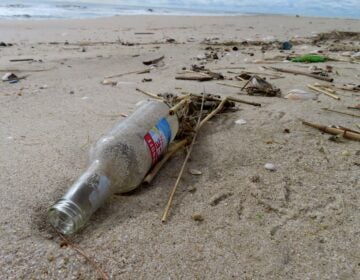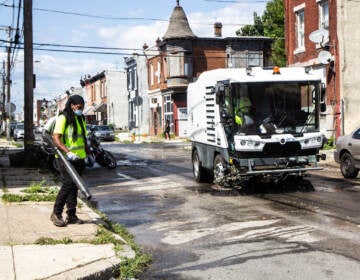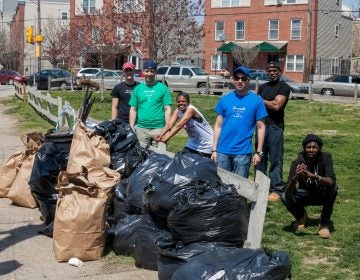I Love Thy Hood aims to solve Philly’s litter crisis with bright orange trash cans
28-year-old Matthew George got tired coming home to a parade of plastic bags, styrofoam take-out food trays and overflowing cans.
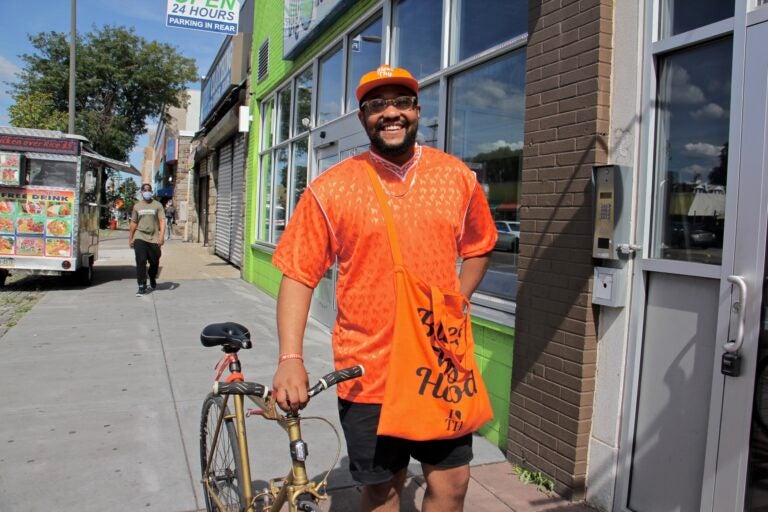
Matthew George started the I Love Thy Hood program in response to a litter problem in his Germantown neighborhood. (Emma Lee/WHYY)
Matthew George and his fiancee Bria Howard are taking Philadelphia’s litter problem into their own hands.
The couple began I Love Thy Hood, a program that supplied vivid orange trash cans to neighborhood businesses and residents in July of 2019. Thirteen months and one pandemic later, it has tripled in size, expanded beyond Germantown and offered inspiration to others seeking ways to clean their communities in the midst of a citywide sanitation crisis.
“It’s a simple plan, that helps out those business owners and those residents on their block because they want to protect their environment as well,” George said. “And it also gives them, or the communities in the area, more opportunities to throw out that waste.”
The trash can program grew out of George’s daily experience. The 28-year-old Germantown resident got tired of arriving home from work after nearly an hour-long commute from his King of Prussia insurance industry job and seeing plastic bags, styrofoam take-out food trays, balled-up paper, and overflowing cans lining his Chelten Avenue block.
“You can’t ignore it,” George said. “As soon as I’m stepping into the streets, it’s surrounding my home. I didn’t know exactly what to do, but there had to be something done about it.”
His timing was prescient. Around the time he began to think about taking action, the Germantown Special Services District tasked with keeping the business district around Germantown and Chelten Avenues clean collapsed, leaving the wire trash baskets the taxpayer-funded group previously managed overflowing, without a reliable keeper.
After watching a woman on Maplewood Mall place an extra trash can out for her block, George knew what he wanted to do. He told his fiancee about the woman’s DIY sanitation solution and they got moving.
“It just made perfect sense,” Howard said. “We don’t have trash cans. Let’s raise money and you know, create trash cans.”
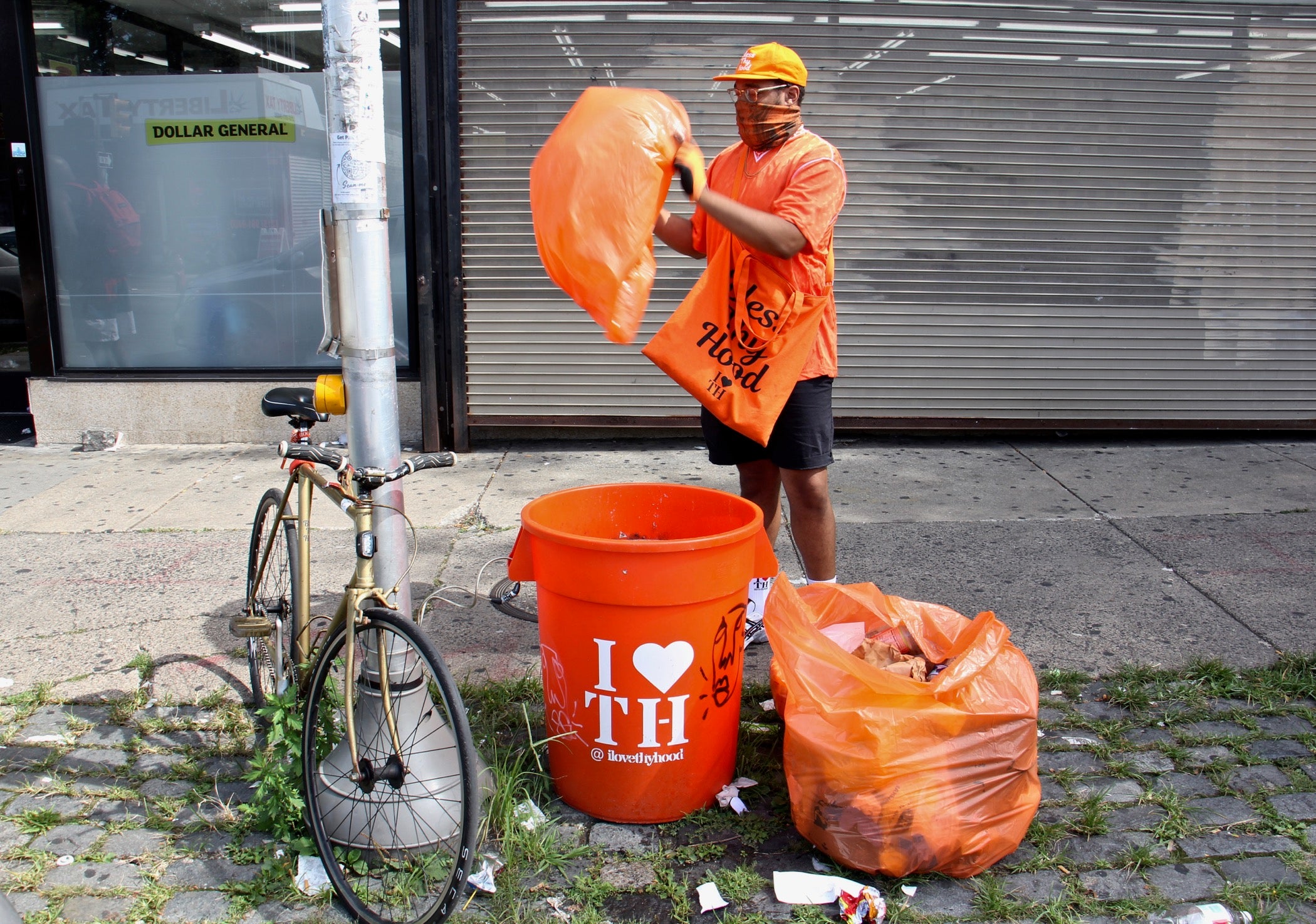
Filling the gaps in an inequitable sanitation system
The program operates simply. A business owner, block captain, or neighbor can request a trash can on the I Love Thy Hood website. They receive a can that gets chained down to prevent theft and clear orange trash bags. The can owner then accepts the responsibility to empty the can when full. George himself empties Chelten Avenue’s four orange receptacles. While the Special Services District was a municipal authority funded to clean streets by business and property owners, George’s group received its initial funds from neighbors and supporters on GoFundMe. The grassroots initiative surpassed an initial $1,000 goal and now has more than $5,000 in donated funds.
George and Howard said they hope this program instills responsibility within neighborhoods. Howard said it’s easy for people to recognize litter but refuse responsibility to remove it.
“When you walk past trash, you think, ‘someone else’s going to deal with it, not my problem,’ Howard said. “The concept here is that if you adopt this, you have to be responsible for it.”
But George notes that while residents and organizations like Love thy Hood can fill a gap, city government and businesses must also take action to fix an inequitable sanitation system.
“When you look around and see where businesses are supporting and where they aren’t, where the care is being given, you see that less in minority communities,” he said.
It’s an observation borne out by the city’s Litter Index, which showed huge disparities in waste on the streets across neighborhoods. The city maps revealed that less affluent neighborhoods with larger populations of Black and brown residents also saw higher rates of illegal dumping.
A 2018 study done by the Kenney administration working with researchers from the University of Pennsylvania, Temple University, and Swarthmore College, additionally found that fewer trash cans on city streets resulted in more litter — a finding that didn’t result in more trash cans provided by the city. While public-private partnerships like the defunct Germantown group have stepped in to fill the void in select areas, most streets do not have these groups and, in the wake of a pandemic that slashed the city’s cleaning budget while increasing trash tonnage, the problem has only worsened.
Potential for growth
This isn’t the first time a Germantown resident took on the trash issue. Last year, Jordan Ferrarini from Trades for a Difference teamed up with community member Keith Schneck to start a 10-week beautification project on the lower end of Germantown. The project involved a large trash truck and paying young adults above $13.50/hr to clean up Germantown’s lower end.
“We found that a lot of our young people take a greater sense of pride in the community when they have direct involvement,” Ferrarini said. “To throw things away, to be able to beautify your neighborhood, from there on out you’re bigger advocate for your community.”
Although the pilot program ended last year, Ferrarini said the group planned on restarting the beautification project on April 7 but were slowed down due to COVID-19 and social distancing.
“Right now, it’s still pending,” Ferrarini said. “As this progresses, we’re going to get a better gauge on when exactly it’s coming back.”
Ferrarini said he doesn’t blame the city for the litter in Germantown. Instead, he describes it as a resource issue — more funding is needed.
George sees strong potential for growth. Many people have reached out to him with interest in supporting his initiative and by the end of 2020, he plans to have incorporated I Love Thy Hood as a nonprofit.
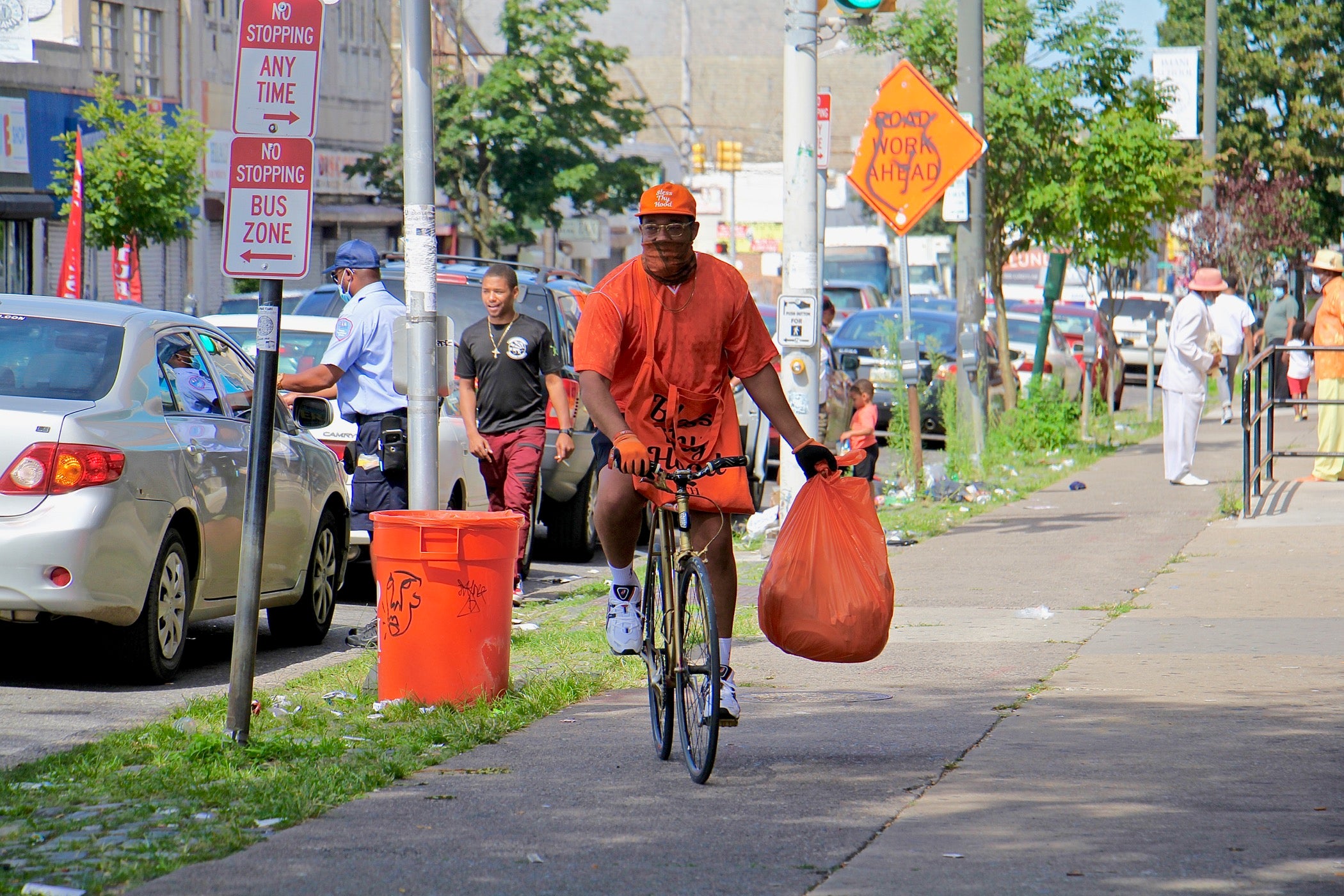
“When I started this, I didn’t have the sanitation on my brain but now, I’m learning and I’d love to grow and be able to provide more services,” George said.

Subscribe to PlanPhilly
WHYY is your source for fact-based, in-depth journalism and information. As a nonprofit organization, we rely on financial support from readers like you. Please give today.




